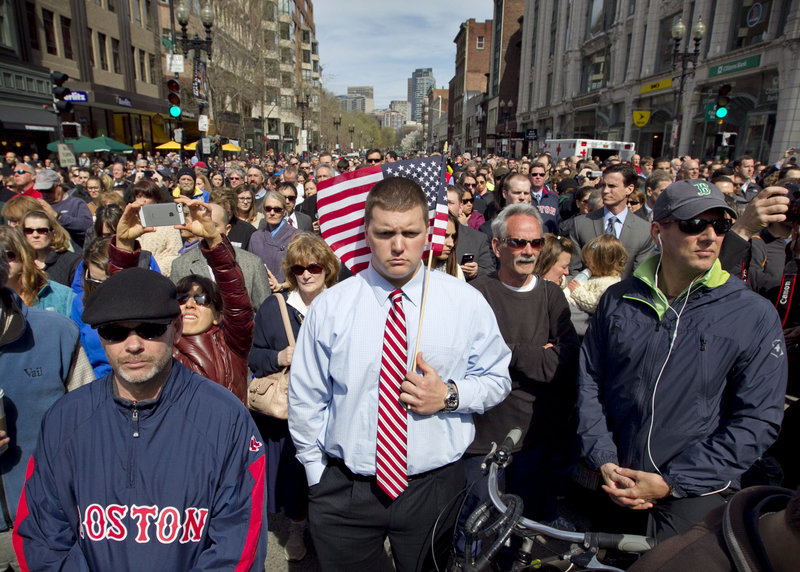BOSTON – They are six small states, settled before the nation’s birth, wedged between New York, Canada and the Atlantic Ocean: New England.
The region is uniquely defined by its compact geography, its culture and its “sense of place,” as Harvard history professor Laurel Thatcher Ulrich put it.
“The mystique that has grown up over the centuries, perpetuated by the invention of celebrations like the ‘First Thanksgiving’ and all the images associated with the Revolution,” she said, “convinced people that there really was something called New England and that it mattered.”
Now, in just a four-month span, a harsh new chapter has been added to that long, distinctive history.
New England scenes have been the backdrop for two body blows of malevolent mass carnage — the Dec. 14 shootings in Newtown, Conn., that killed 20 children and six staff members at Sandy Hook Elementary School and the Boston Marathon bombings on April 15 that killed three people and injured more than 260.
Yet even amid the horror, the nation and world again glimpsed the old New England spirit and solidarity.
The bombings were a reminder of Boston’s role as de facto capital of New England. Its sports teams, most notably the Red Sox, are avidly followed in all six states. Its marathon draws competitors from across the region and around the world — and attracts thousands of regional spectators, too.
An eight-member group from Newtown competed in the marathon, seeking support for a scholarship fund to benefit siblings of the shooting victims. Before the start, there were 26 seconds of silence in honor of the Connecticut victims, and each mile of the race was dedicated to one of them.
So the pain has been shared — and so has the post-bombing effort to respond resiliently. Members of the Newtown group said they would expand their efforts to also support the bombing victims.
“We’re looking for things to pull us together, and the tragedy gave us a focal point — the more so that it happened at one of our defining regional events,” said Boston University Professor William Moore, a cultural history specialist affiliated with BU’s Program in American and New England Studies.
At least in living memory, New England has not experienced a gun rampage as deadly as the Newtown shootings nor a terrorist attack on par with the marathon bombings.
Yet the region has by no means been immune from calamities.
Ten years ago, in one of the deadliest fires ever in the U.S., 100 people were killed after a pyrotechnics display ignited a blaze during a rock concert at The Station, an overcrowded nightclub in West Warwick, R.I. Its owners had tried to stem noise complaints by lining the walls with what turned out to be flammable packing foam.
In 2011, Tropical Storm Irene wreaked havoc on Vermont, New England’s only landlocked state. Up to 11 inches of rain fell in some areas on Aug. 27-28, displacing thousands from their homes, killing six people, damaging or destroying 500 miles of roads and 200 bridges, including several of the state’s iconic covered bridges. About a dozen communities were cut off for days.
But soon afterward, Vermonters began to rally around the phrase, “I am Vermont Strong,” which is still found on many license plates that were sold to help finance recovery projects.
Gov. Peter Shumlin, in office just eight months when Irene hit, was in Boston on April 21 — six days after the marathon bombing — to attend the Red Sox’ annual Vermont Day.
“You feel exactly the same spirit in the streets of Boston right now. We were Vermont Strong; they are Boston Strong,” Shumlin said. “The American people are the best people in the world and they care about neighbors, they care about strangers and we’re not going to let storms or senseless terrorists take us down.”
Maine and New Hampshire have been spared large-scale calamities in recent decades, though they’ve had their share of jarring incidents.
In 1997, a New Hampshire man fatally shot two state troopers, a judge and a newspaper editor in the far-north town of Colebrook before being killed by police in Vermont. In Maine, 14 migrant workers died in 2002 when a van plunged off a bridge — the worst traffic accident in state history.
In Massachusetts, seven employees of a technology firm in Wakefield were shot dead in 2000 by a co-worker. Connecticut has suffered two workplace-related mass shootings since 1998 — one claiming nine lives at a Manchester beer distributor, the other leaving five dead at the state lottery headquarters in Newington.
Further back, all of New England — particularly Rhode Island — was battered by the great hurricane of 1938, which killed more than 600 people and wrecked tens of thousands of homes.
Send questions/comments to the editors.



Success. Please wait for the page to reload. If the page does not reload within 5 seconds, please refresh the page.
Enter your email and password to access comments.
Hi, to comment on stories you must . This profile is in addition to your subscription and website login.
Already have a commenting profile? .
Invalid username/password.
Please check your email to confirm and complete your registration.
Only subscribers are eligible to post comments. Please subscribe or login first for digital access. Here’s why.
Use the form below to reset your password. When you've submitted your account email, we will send an email with a reset code.